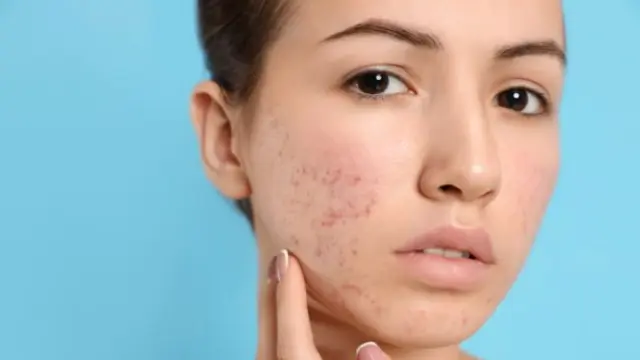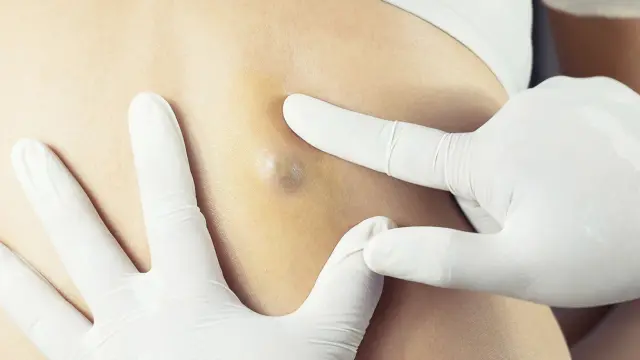If you’re grappling with persistent acne, seeking professional help from a dermatologist can be beneficial. Dermatologists specialize in diagnosing and treating various skin conditions, including acne, providing personalized treatment plans tailored to your specific needs. Whether you’re dealing with mild breakouts or severe cystic acne, a dermatologist can offer expert guidance, prescribe effective medications, and perform in-office procedures to improve your skin’s condition and boost your confidence. Let’s understand what acne is, its types, and why you should go to a dermatologist for acne treatment.
What Is Acne?
Acne is a common skin problem that causes pimples, blackheads, whiteheads, cysts, and nodules on various body areas, most commonly the face, chest, and back. It happens when oil & dead skin cells block the hair follicles, causing inflammation and sores.
What Are the Types of Acne?
Acne manifests in various forms, each with distinct characteristics and treatment approaches:
Cystic Acne: Cystic acne is the most severe form, characterized by deep, painful cysts beneath the skin’s surface. If not treated promptly, cystic acne can lead to scarring.
Hormonal Acne: Hormonal fluctuations, particularly during puberty, menstruation, pregnancy, or hormonal disorders, can trigger hormonal acne, typically as inflammatory lesions around the chin, jawline, and cheeks.
Fungal Acne: Fungal Acne, also known as Malassezia folliculitis, occurs due to an overgrowth of yeast within hair follicles. It results in small, itchy bumps resembling acne lesions.
Nodular Acne: Nodular acne is distinguished by big, painful pimples deep within the skin. If not appropriately addressed, it can result in significant inflammation and scarring.
What Are the Symptoms of Acne?
Acne symptoms vary depending on the type and severity but commonly include:
Blackheads: Open pores filled with excess oil and dead skin cells, appearing as small dark spots on the skin’s surface.
Whiteheads: Closed pores clogged with oil and skin debris, resulting in small, white bumps on the skin.
Papules: Small, red bumps caused by inflamed or infected hair follicles.
Pustules: Pimples filled with pus, characterized by white or yellow tips and surrounded by red, inflamed skin.
Cysts: Cysts or Nodules are deep, painful lesions beneath the skin’s surface, often accompanied by inflammation and tenderness.
What Causes Acne?
Acne develops due to factors including:
Excess Sebum Production: The sebaceous glands’ overproduction of sebum can clog hair follicles and stimulate bacterial development, causing acne.
Hormonal Changes: Fluctuations in hormone levels, particularly androgens like testosterone, can increase sebum production, contributing to acne development.
Genetics: Family history is also a significant factor in acne susceptibility, with genetics influencing sebum production and skin inflammation.
Bacterial Infection: Propionibacterium acnes, a type of skin bacteria, can multiply in closed pores, causing inflammation and acne.
Dietary Factors: Certain foods high in refined carbohydrates and dairy products may exacerbate acne symptoms in susceptible individuals.
Environmental Factors: Exposure to pollutants, humid weather, and friction from tight clothing or helmets can worsen acne by clogging pores & irritating the skin.
Side Effects of Acne Treatment
Acne treatments, while effective, may come with potential side effects, including:
Dryness and Irritation: Topical treatments like benzoyl peroxide and retinoids can cause dryness, redness, and peeling, especially during the initial stages of treatment.
Sensitivity to Sun: Some acne medications increase skin sensitivity to sunlight, raising the risk of sunburn and skin damage without proper sun protection.
Allergic Reactions: Certain ingredients in acne products may trigger allergic reactions in individuals, leading to itching, redness, or swelling.
Increased Risk of Infection: Invasive acne treatments like corticosteroid injections or drainage procedures risk infection if not executed under sterile conditions.
Skin Discoloration: Prolonged use of specific acne treatments, such as oral antibiotics and topical retinoids, may cause skin discoloration or hyperpigmentation in some individuals.
How Can a Dermatologist Help with Acne?
Dermatologists are specialists trained in diagnosing and treating various skin conditions, including acne. Here’s how they can assist in managing acne effectively:
Accurate Diagnosis: Dermatologists can determine the type and severity of acne through a comprehensive skin examination, identifying any underlying factors contributing to the condition.
Personalized Treatment Plans: Based on the individual’s skin type, acne severity, and medical history, dermatologists devise personalized treatment plans combining topical medications, oral medications, and procedural interventions for optimal results.
Prescription Medications: Dermatologists may prescribe topical drugs such as retinoids, benzoyl peroxide, or antibiotics to combat acne-causing bacteria, reduce inflammation, and increase skin cell turnover.
Oral Medications: In severe or persistent acne, dermatologists may recommend oral medications like antibiotics, hormonal therapies, or isotretinoin to address underlying factors contributing to acne formation.
Procedural Interventions: Dermatologists perform various in-office procedures like chemical peels, microdermabrasion, corticosteroid injections, or laser therapy to accelerate acne healing, reduce scarring, and improve skin texture.
Regular Monitoring and Follow-Up: Dermatologists monitor the patient’s response to treatment, adjusting the regimen to optimize outcomes and minimize side effects. They also provide guidance on skincare routines and lifestyle modifications to prevent acne recurrence.
Conclusion
Seeking guidance from a dermatologist for acne management can significantly improve treatment outcomes & enhance overall skin health. If you’re struggling with persistent acne that doesn’t respond to over-the-counter remedies, schedule an appointment with our qualified Acne dermatologist to explore personalized treatment options tailored to your needs. Don’t let acne undermine your confidence and well-being—take proactive steps towards clearer, healthier skin today.





